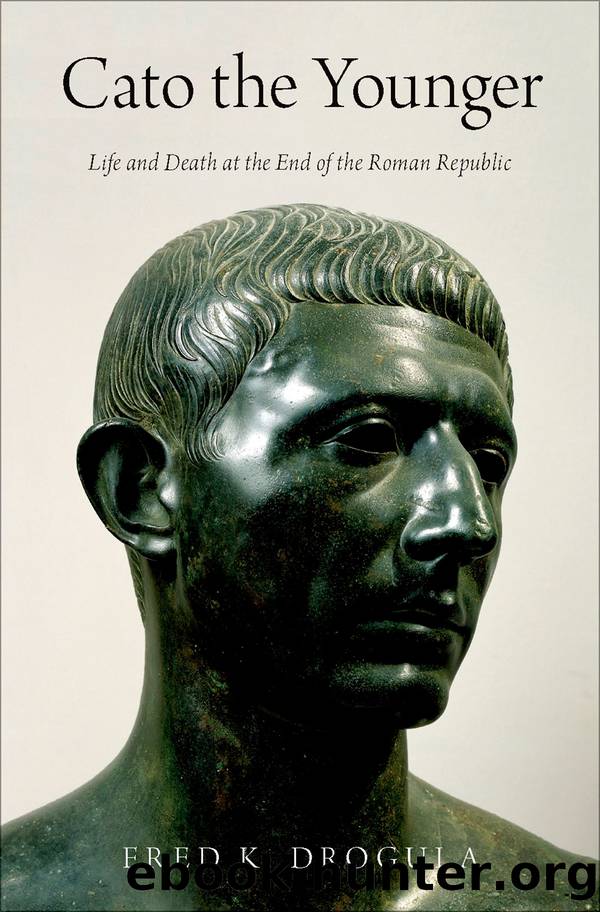Cato the Younger: Life and Death at the End of the Roman Republic by Fred K. Drogula

Author:Fred K. Drogula [Drogula, Fred K.]
Language: eng
Format: epub
Tags: Biography & Autobiography, General, history, Ancient, Rome
ISBN: 9780190869021
Google: ECiPDwAAQBAJ
Publisher: Oxford University Press
Published: 2019-11-15T00:30:30.910550+00:00
This passage is curious becauseâif it is accurateâit seems to reveal a shifting strategy against the triumvirs. Rather than attacking them altogether, as he had been doing unsuccessfully for several years, Cato was attempting to drive a wedge between them, playing on Pompeyâs ambitions and fears in an effort to make him afraid of Caesar. This was the same strategy that Cicero had been trying to pursue for several years, and he also warned Pompey that he was digging his own grave by extending Caesarâs command in Gaul.123 It is possible, therefore, that Cato began to see the advantages of Ciceroâs approach. This should not be taken as an indication that he was considering an alliance with Pompey, since he remained opposed to Pompey in most of the important political events of their day.124 Rather, the inability of the optimates to suppress the triumvirate as a whole may have convinced him that a new strategy was needed, or at least a wider range of tactics. At the moment, however, Cato failed to persuade Pompey, and the lex Licinia Pompeia easily passed, giving Caesar his wished-for extension of command.125
The triumvirs had acquired their respective goals by the end of April (55 bc): Caesarâs command was renewed, Crassus had received the province in Syria and expected to reap glory and wealth by attacking Parthia, and Pompey had acquired the two Spanish provinces but would remain at Rome and govern them through legates.126 With these goals achieved, the triumvirs probably felt a great deal of satisfaction, since they would all possess imperium, a command, and legal immunity from prosecution for five years. Having achieved these victories, Pompey and Crassus seem to have done little that was controversial for the remainder of their consulships, but their successes had come at a significant cost. Their blatant use of bribery and violence caused a backlash of public opinion against them, and gave credence to Catoâs accusation that the triumvirs were tyrants trampling Romeâs ancient traditions. Cato was an expert at using (and manipulating) tradition for political ends, and his persistent warnings that the triumvirs were laying the groundwork for a tyranny that would destroy Roman libertas began to bear fruit. In the summer elections, the Romans gave their votes to candidates known to oppose the triumvirate, electing Domitius Ahenobarbus to the consulship and Cato to the praetorship of 54 bc. Cato drew the presidency of the extortion court as his praetorian assignment, which must have pleased him very much, since he would preside over trials of men accused of corruption in the provinces. It is possible that the triumvirsâsecure in their military commands and with legal immunity from prosecutionâdid not attempt to block their political opponents, or it may have been that the popular support for these respected nobiles had grown too strong to suppress at the time, but they did make sure that their new ally Appius Claudius was also elected to the consulship.
Their success in the summer elections certainly cheered Catoâs circle, and they
Download
This site does not store any files on its server. We only index and link to content provided by other sites. Please contact the content providers to delete copyright contents if any and email us, we'll remove relevant links or contents immediately.
Harry Potter and the Goblet Of Fire by J.K. Rowling(3025)
Unfinished: A Memoir by Priyanka Chopra Jonas(2911)
Never by Ken Follett(2873)
The Man Who Died Twice by Richard Osman(2290)
Machine Learning at Scale with H2O by Gregory Keys | David Whiting(2267)
Fairy Tale by Stephen King(2058)
Will by Will Smith(2033)
Rationality by Steven Pinker(1761)
The Storyteller by Dave Grohl(1656)
The Dawn of Everything: A New History of Humanity by David Graeber & David Wengrow(1565)
The Dark Hours by Michael Connelly(1562)
The Stranger in the Lifeboat by Mitch Albom(1529)
Cloud Cuckoo Land by Anthony Doerr(1428)
The Becoming by Nora Roberts(1324)
Friends, Lovers, and the Big Terrible Thing by Matthew Perry(1324)
Einstein: His Life and Universe by Walter Isaacson(1312)
Crying in H Mart by Michelle Zauner(1312)
New Morning Mercies: A Daily Gospel Devotional by Paul David Tripp(1301)
A Short History of War by Jeremy Black(1295)
